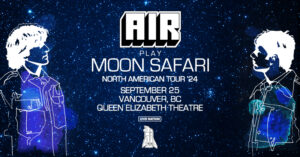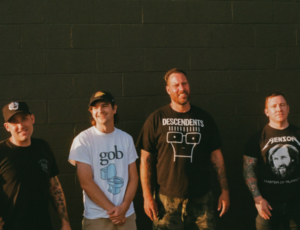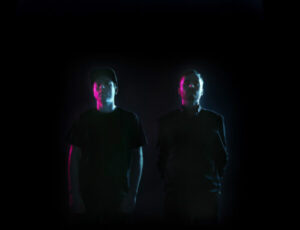
Last month, I had the opportunity to
speak with Aaron Hemphill of Liars, which I knew at the time to be a very unusual experimental band. Their latest album was as Hemphill testified, rife with struggle. Its story and its dark electronic sounds came together to produce an album that possessed that mysterious and elusive quality that prompts listeners to investigate and explore.
I was most interested though, in how an album like that would translate live – its slow and brooding swells seemed complicated to produce from a three-piece band and also an odd thing to lay on a room full of Pabst drinkers. Hemphill had told me that the band had to basically rearrange the entire album to do it live, so I was excited to hear what Liars would bring to the Biltmore on Monday.
Soon after the band got on stage, I found out what kind of ‘rearrangement’ Hemphill was talking about. In the span of an hour and a half, Liars transformed from being an unusual experimental band to the sonic equivalent of an intercontinental
ballistic missile.
The band was kind enough not to jettison us into the stratosphere immediately however, and their first few songs were what I (originally had feared) would define their entire live show. Slow, minimalistic, and performed with an attitude almost apathetic to the audience. It was as if we had been invited to their rehearsal. But this was only (I assume) done for comparative purposes, because the band quickly removed this unassuming cap from their head to reveal the screaming nest of starving vultures hiding underneath.
We suddenly had blastoff.
I have never been to a show that is so cacophonous that I cannot hear the
drums of all things, but Liars seemed to manage this with ease. The trick, apparently, is to strum all the strings on your guitar absently without fretting any of them, while wailing incoherently into the microphone. Then the bass must attempt to be so loud that the only way to play the drums is to simply mute the cymbals you
don’t want to hear, because they are all reverberating with such wild abandon. Occasionally the sound would quiet down enough for me to hear singer Angus Andrew yell “Die! Die! Die!”, which in that moment, seemed like a request I was well on my way to fulfilling.
There is nothing wrong with noise. It’s visceral, full of energy, and when done right, it’s incoherent and dissonant in all the right ways.
Listening to good noise-rock is like watching a good horror film.
They embody the elements traditionally thought of as being unenjoyable, which is why they’re so interesting when they
are enjoyable. Good noise is a statement about what sounds we value, and the genre challenges our preconceptions about what qualities we consider when thinking about ‘good’ songs.
But good noise is so hard to do. If a horror film was just non-stop gore, monsters jumping out of closets, and shocking imagery with no suspense or care for pace it would be a
bad horror film. The same can be said about a noise-rock band that literally just makes the sum total of every possible sound they can at once – like a sonic shotgun on automatic fire, with no care for the structure or placement of these sounds. That is indeed the secret that Liars seemed to forget: that good noise-rock shouldn’t sound so, well,
noisy.
Something that Liars is known for is their impartiality to any one genre across their discography, and while the show mostly focused on their newer music, old styles filled in the gaps between. But the problem with having a history of songs that all sound quite different is that a set list can easily become jarring and disconnected if it’s not properly designed, like watching a movie with its scenes out of order. This was the feeling through a lot of Liars’ set, when a six-minute warbling synth epic was followed by a half-minute speed-punk screamer, only to go immediately back into synth-land before I’d even noticed the change.
Of course, one’s place in the set-list might have been more easily found if Liars had attempted to connect with the audience at all between songs, but instead, they opted for a purely musical approach, which is fine, but only added to my feelings of disconnection to what was happening on stage.
Perhaps it is the result of the tumultuous recording of the new album WIXIW, or perhaps it was just a good-intentioned desire to give the audience a taste of everything and to leave no gun left unfired, but Liars’ performance seemed to lack structure, direction, or a conscious understanding of the meaning of the word ‘dynamic’, in my opinion.
Unfortunately, the music itself was not really the problem – as I mentioned during my interview with Hemphill, the album is dense, strange, innovative, and had me coming back to it over and over because it was so wonderfully different. It was the overambitious and overcompensating presentation of the music that ended up souring my enjoyment of songs I had previously liked listening to.
If anything, I remain confident in saying that Liars are all still absolutely, wonderfully, and completely nuts.
 Last month, I had the opportunity to speak with Aaron Hemphill of Liars, which I knew at the time to be a very unusual experimental band. Their latest album was as Hemphill testified, rife with struggle. Its story and its dark electronic sounds came together to produce an album that possessed that mysterious and elusive quality that prompts listeners to investigate and explore.
I was most interested though, in how an album like that would translate live – its slow and brooding swells seemed complicated to produce from a three-piece band and also an odd thing to lay on a room full of Pabst drinkers. Hemphill had told me that the band had to basically rearrange the entire album to do it live, so I was excited to hear what Liars would bring to the Biltmore on Monday.
Soon after the band got on stage, I found out what kind of ‘rearrangement’ Hemphill was talking about. In the span of an hour and a half, Liars transformed from being an unusual experimental band to the sonic equivalent of an intercontinental ballistic missile.
The band was kind enough not to jettison us into the stratosphere immediately however, and their first few songs were what I (originally had feared) would define their entire live show. Slow, minimalistic, and performed with an attitude almost apathetic to the audience. It was as if we had been invited to their rehearsal. But this was only (I assume) done for comparative purposes, because the band quickly removed this unassuming cap from their head to reveal the screaming nest of starving vultures hiding underneath.
We suddenly had blastoff.
I have never been to a show that is so cacophonous that I cannot hear the drums of all things, but Liars seemed to manage this with ease. The trick, apparently, is to strum all the strings on your guitar absently without fretting any of them, while wailing incoherently into the microphone. Then the bass must attempt to be so loud that the only way to play the drums is to simply mute the cymbals you don’t want to hear, because they are all reverberating with such wild abandon. Occasionally the sound would quiet down enough for me to hear singer Angus Andrew yell “Die! Die! Die!”, which in that moment, seemed like a request I was well on my way to fulfilling.
There is nothing wrong with noise. It’s visceral, full of energy, and when done right, it’s incoherent and dissonant in all the right ways.
Listening to good noise-rock is like watching a good horror film.
They embody the elements traditionally thought of as being unenjoyable, which is why they’re so interesting when they are enjoyable. Good noise is a statement about what sounds we value, and the genre challenges our preconceptions about what qualities we consider when thinking about ‘good’ songs.
But good noise is so hard to do. If a horror film was just non-stop gore, monsters jumping out of closets, and shocking imagery with no suspense or care for pace it would be a bad horror film. The same can be said about a noise-rock band that literally just makes the sum total of every possible sound they can at once – like a sonic shotgun on automatic fire, with no care for the structure or placement of these sounds. That is indeed the secret that Liars seemed to forget: that good noise-rock shouldn’t sound so, well, noisy.
Something that Liars is known for is their impartiality to any one genre across their discography, and while the show mostly focused on their newer music, old styles filled in the gaps between. But the problem with having a history of songs that all sound quite different is that a set list can easily become jarring and disconnected if it’s not properly designed, like watching a movie with its scenes out of order. This was the feeling through a lot of Liars’ set, when a six-minute warbling synth epic was followed by a half-minute speed-punk screamer, only to go immediately back into synth-land before I’d even noticed the change.
Of course, one’s place in the set-list might have been more easily found if Liars had attempted to connect with the audience at all between songs, but instead, they opted for a purely musical approach, which is fine, but only added to my feelings of disconnection to what was happening on stage.
Perhaps it is the result of the tumultuous recording of the new album WIXIW, or perhaps it was just a good-intentioned desire to give the audience a taste of everything and to leave no gun left unfired, but Liars’ performance seemed to lack structure, direction, or a conscious understanding of the meaning of the word ‘dynamic’, in my opinion.
Unfortunately, the music itself was not really the problem – as I mentioned during my interview with Hemphill, the album is dense, strange, innovative, and had me coming back to it over and over because it was so wonderfully different. It was the overambitious and overcompensating presentation of the music that ended up souring my enjoyment of songs I had previously liked listening to.
If anything, I remain confident in saying that Liars are all still absolutely, wonderfully, and completely nuts.
Last month, I had the opportunity to speak with Aaron Hemphill of Liars, which I knew at the time to be a very unusual experimental band. Their latest album was as Hemphill testified, rife with struggle. Its story and its dark electronic sounds came together to produce an album that possessed that mysterious and elusive quality that prompts listeners to investigate and explore.
I was most interested though, in how an album like that would translate live – its slow and brooding swells seemed complicated to produce from a three-piece band and also an odd thing to lay on a room full of Pabst drinkers. Hemphill had told me that the band had to basically rearrange the entire album to do it live, so I was excited to hear what Liars would bring to the Biltmore on Monday.
Soon after the band got on stage, I found out what kind of ‘rearrangement’ Hemphill was talking about. In the span of an hour and a half, Liars transformed from being an unusual experimental band to the sonic equivalent of an intercontinental ballistic missile.
The band was kind enough not to jettison us into the stratosphere immediately however, and their first few songs were what I (originally had feared) would define their entire live show. Slow, minimalistic, and performed with an attitude almost apathetic to the audience. It was as if we had been invited to their rehearsal. But this was only (I assume) done for comparative purposes, because the band quickly removed this unassuming cap from their head to reveal the screaming nest of starving vultures hiding underneath.
We suddenly had blastoff.
I have never been to a show that is so cacophonous that I cannot hear the drums of all things, but Liars seemed to manage this with ease. The trick, apparently, is to strum all the strings on your guitar absently without fretting any of them, while wailing incoherently into the microphone. Then the bass must attempt to be so loud that the only way to play the drums is to simply mute the cymbals you don’t want to hear, because they are all reverberating with such wild abandon. Occasionally the sound would quiet down enough for me to hear singer Angus Andrew yell “Die! Die! Die!”, which in that moment, seemed like a request I was well on my way to fulfilling.
There is nothing wrong with noise. It’s visceral, full of energy, and when done right, it’s incoherent and dissonant in all the right ways.
Listening to good noise-rock is like watching a good horror film.
They embody the elements traditionally thought of as being unenjoyable, which is why they’re so interesting when they are enjoyable. Good noise is a statement about what sounds we value, and the genre challenges our preconceptions about what qualities we consider when thinking about ‘good’ songs.
But good noise is so hard to do. If a horror film was just non-stop gore, monsters jumping out of closets, and shocking imagery with no suspense or care for pace it would be a bad horror film. The same can be said about a noise-rock band that literally just makes the sum total of every possible sound they can at once – like a sonic shotgun on automatic fire, with no care for the structure or placement of these sounds. That is indeed the secret that Liars seemed to forget: that good noise-rock shouldn’t sound so, well, noisy.
Something that Liars is known for is their impartiality to any one genre across their discography, and while the show mostly focused on their newer music, old styles filled in the gaps between. But the problem with having a history of songs that all sound quite different is that a set list can easily become jarring and disconnected if it’s not properly designed, like watching a movie with its scenes out of order. This was the feeling through a lot of Liars’ set, when a six-minute warbling synth epic was followed by a half-minute speed-punk screamer, only to go immediately back into synth-land before I’d even noticed the change.
Of course, one’s place in the set-list might have been more easily found if Liars had attempted to connect with the audience at all between songs, but instead, they opted for a purely musical approach, which is fine, but only added to my feelings of disconnection to what was happening on stage.
Perhaps it is the result of the tumultuous recording of the new album WIXIW, or perhaps it was just a good-intentioned desire to give the audience a taste of everything and to leave no gun left unfired, but Liars’ performance seemed to lack structure, direction, or a conscious understanding of the meaning of the word ‘dynamic’, in my opinion.
Unfortunately, the music itself was not really the problem – as I mentioned during my interview with Hemphill, the album is dense, strange, innovative, and had me coming back to it over and over because it was so wonderfully different. It was the overambitious and overcompensating presentation of the music that ended up souring my enjoyment of songs I had previously liked listening to.
If anything, I remain confident in saying that Liars are all still absolutely, wonderfully, and completely nuts. 









